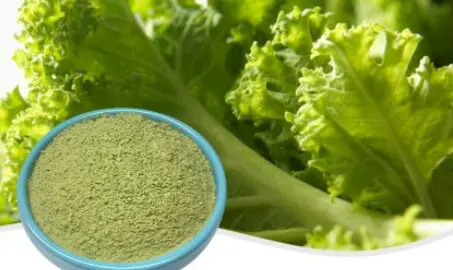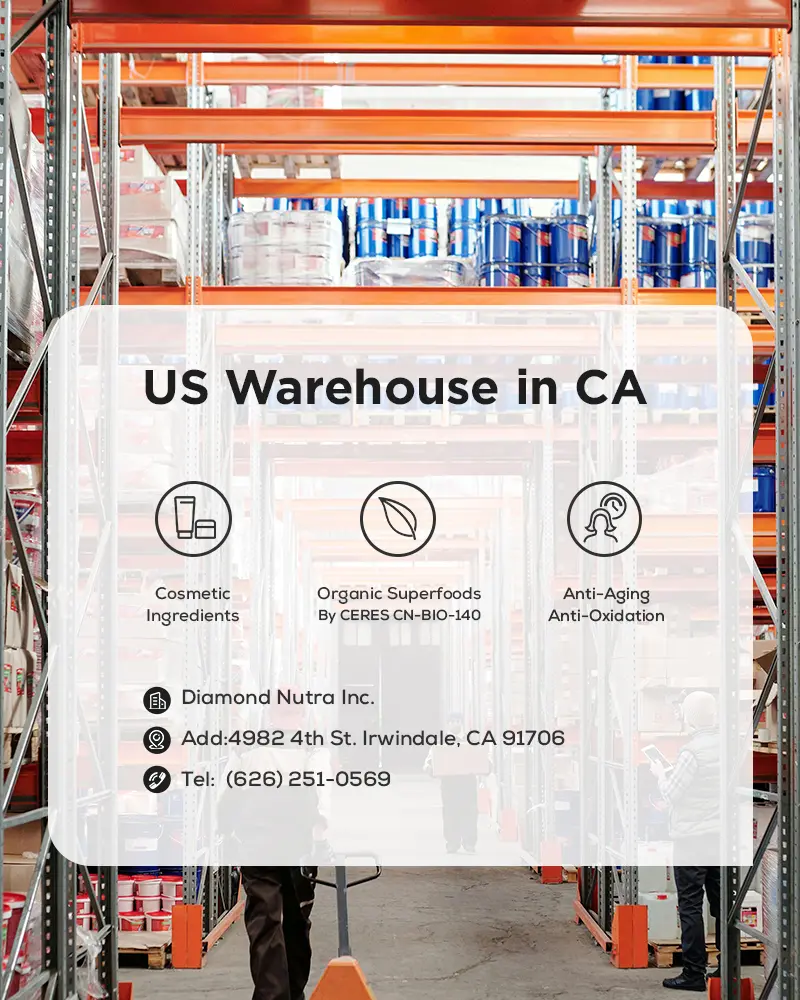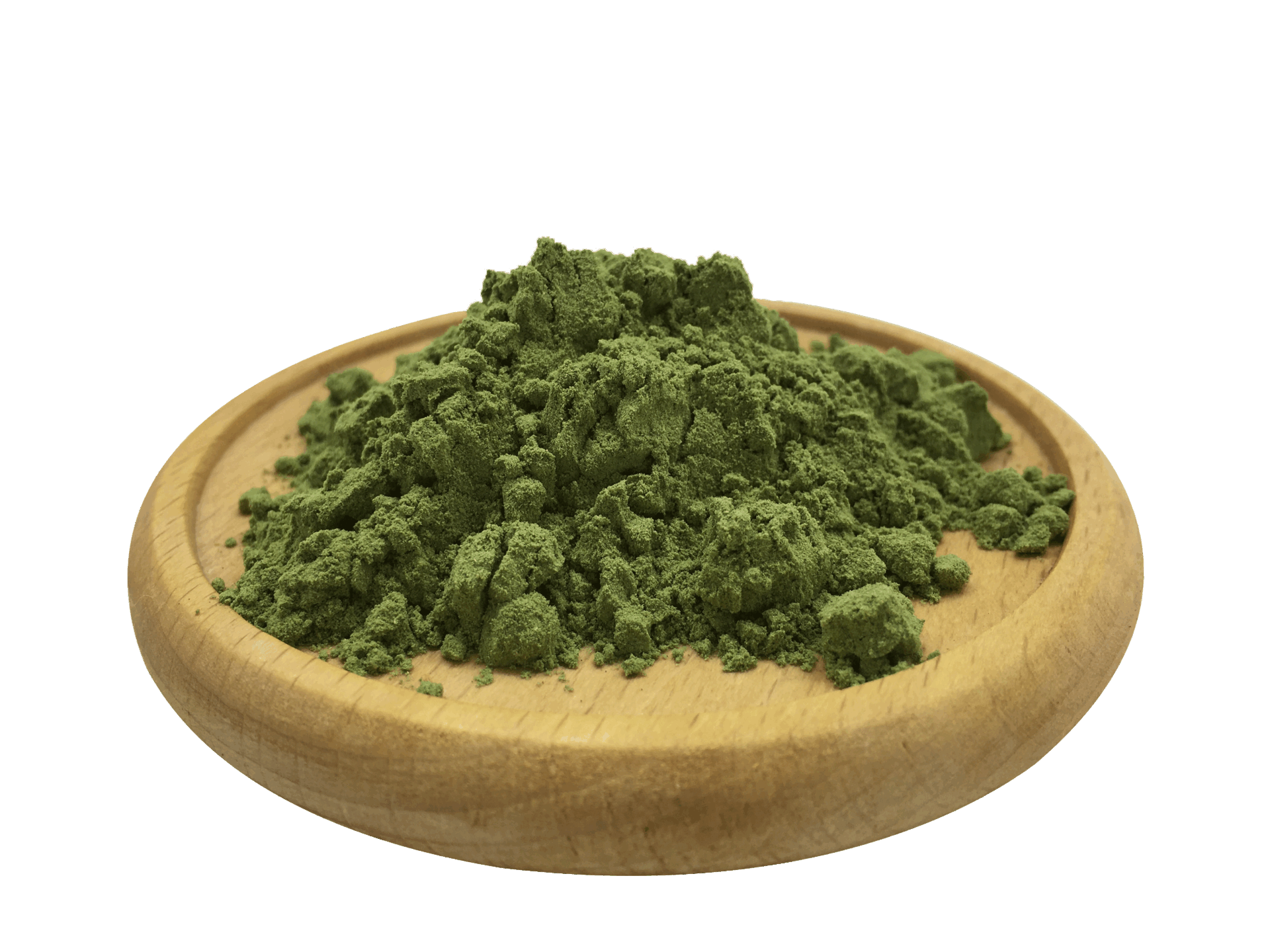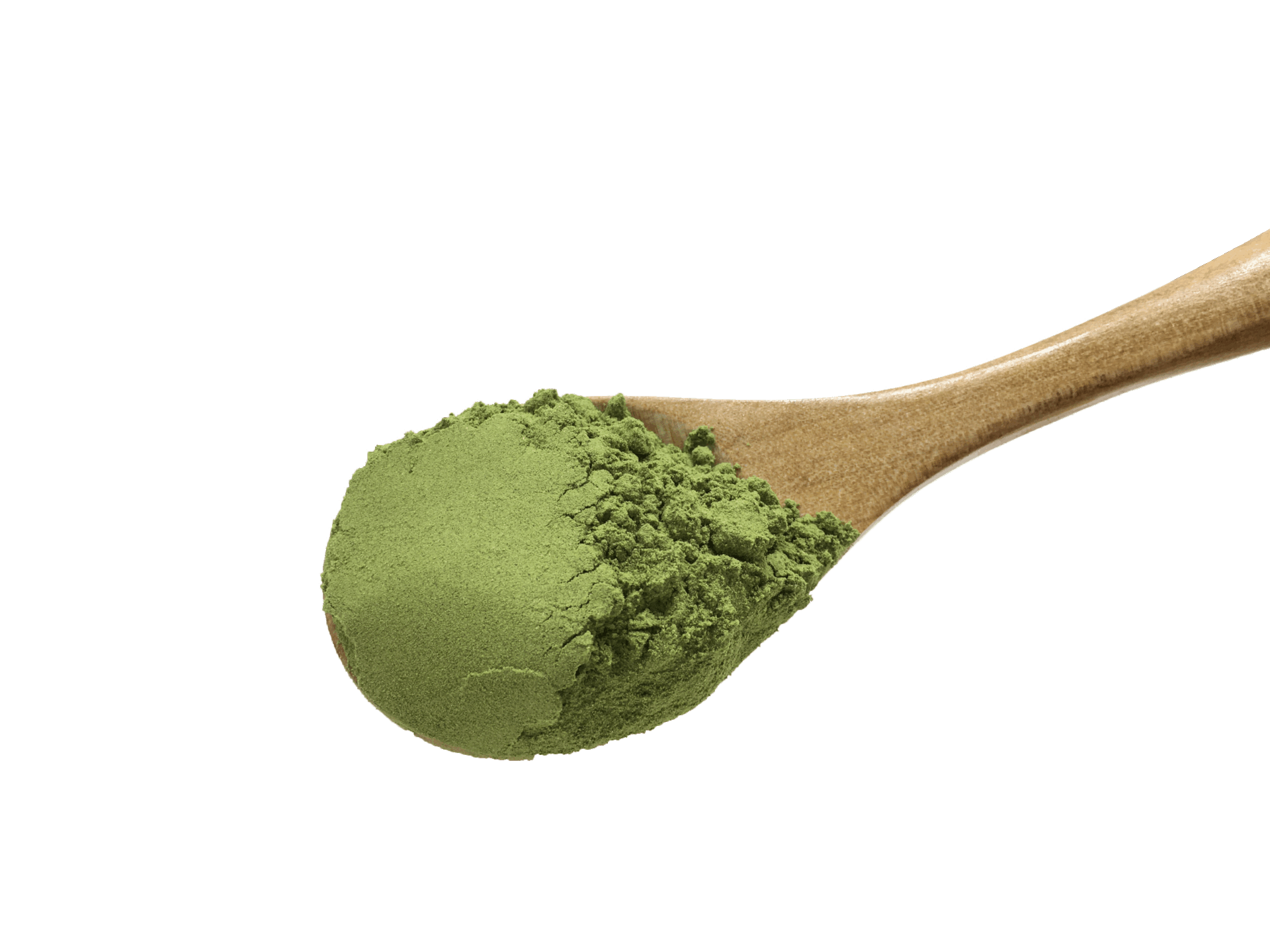Kale powder, though just a small powder, contains a wide variety of nutrients, like a carefully constructed nutritional matrix, providing comprehensive support for the human body.
(I) Vitamin Clusters Enhance Physiological Functions
Kale powder is rich in various key vitamins. Every 100 grams of kale powder contains abundant Vitamin A (existing as a precursor to beta-carotene). Like a loyal guardian of the eyes, it is converted into retinaldehyde or retinol in the retina, participating in visual signal transmission, preventing vision problems such as night blindness, and laying the foundation for our clear perception of the world. The Vitamin C content is even more impressive, about 1.5 times that of citrus fruits. This powerful antioxidant not only enhances the activity of white blood cells and boosts immunity, helping the body resist external pathogens, but it is also an essential substance for collagen synthesis, keeping skin elastic and radiant and reducing wrinkles. The Vitamin K1 content is astonishingly high, reaching 5-6 times the daily requirement. It plays a crucial role in bone calcium metabolism, working synergistically with calcium to precisely deposit calcium into bones, increasing bone density, reducing the risk of osteoporosis, and protecting bone health and strength.
(II) Highly Efficient Absorption of Minerals in Chelated Form
In kale powder, minerals such as calcium, iron, potassium, and magnesium exist in a bioactive chelated form. This special form significantly improves the absorption rate of minerals, increasing it by 30%-40% compared to a regular diet. Calcium, in synergy with vitamin K1, more effectively enters bone tissue, strengthening bones and providing crucial nutritional support for those at risk of osteoporosis, such as the elderly and postmenopausal women. Iron participates in hemoglobin synthesis, delivering oxygen to various tissues and organs, preventing iron-deficiency anemia, and maintaining energy levels. Potassium is essential for maintaining a normal heart rhythm and stable blood pressure; it promotes sodium excretion, regulates electrolyte balance, and protects cardiovascular health. Magnesium, as an activator of various enzymes, participates in energy metabolism, nerve conduction, and other physiological processes, contributing to the normal functioning of various bodily systems.
(III) Natural Antioxidant Complex
Kale powder contains a variety of natural antioxidants, forming a powerful antioxidant defense system. Among them, glucosinolates are a unique class of bioactive substances that can be converted into sulforaphane in the human body through enzymatic hydrolysis. Sulforaphane is one of the most potent known Nrf2 activators. Once inside cells, sulforaphane acts like a “total defense system,” activating the Nrf2 antioxidant pathway and prompting cells to synthesize large amounts of second-stage detoxification enzymes and endogenous antioxidants, such as glutathione S-transferase, superoxide dismutase, and catalase. These substances work synergistically to efficiently neutralize free radicals and reduce oxidative stress damage to cells. Simultaneously, antioxidants such as flavonoids and polyphenols also play an important role. They work in conjunction with sulforaphane to further enhance antioxidant capacity and slow down the cellular aging process. For office workers who are exposed to electronic screen radiation for long periods of time, and outdoor workers who are frequently exposed to ultraviolet radiation, drinking 5-10 grams of kale powder daily can replenish the body with rich antioxidants, reduce the damage of free radicals to the body, and maintain the youth and vitality of cells.
Gut Health Engine: A Synergistic Digestive Tract Care Solution with Dual Fibers
In the journey to maintaining gut health, kale powder, with its unique dual-fiber system and prebiotic properties, has become an outstanding gut health engine, providing a comprehensive and efficient solution for digestive tract care.
(I) Dual-Effect Regulatory Mechanism of Dietary Fiber
Kale powder is a treasure trove of dietary fiber, containing 3-4 grams of dietary fiber per 100 grams. The precise ratio of soluble and insoluble dietary fiber together constructs a powerful gut health maintenance system. Soluble dietary fiber acts like a gentle guardian; upon entering the body, it quickly combines with water to form a viscous gel-like substance. This substance plays an important role in the stomach, slowing gastric emptying and prolonging the time food stays in the stomach, thus creating a longer-lasting feeling of fullness. For those controlling their weight, this feeling of fullness is undoubtedly a boon, effectively reducing food intake and helping people better control calorie intake. Meanwhile, soluble dietary fiber can also enter the small intestine, where it further functions. It can coat carbohydrates, slowing down their digestion and absorption, thus stabilizing blood sugar levels and reducing postprandial blood sugar fluctuations.
Complementing this, insoluble dietary fiber acts like a “cleaner” in the intestines. With its unique physical structure, it promotes intestinal peristalsis and improves functional constipation. Insoluble dietary fiber is mainly composed of cellulose, hemicellulose, and lignin. These components are hardly digested and absorbed in the intestines, but they can absorb large amounts of water like a sponge, causing stool to swell and soften. The swollen stool stimulates the intestinal wall, triggering the peristaltic reflex, increasing intestinal motility, accelerating stool transit time, and shortening stool retention time. Studies have shown that adequate daily intake of insoluble dietary fiber can shorten stool retention time in the intestines by about one-third, effectively preventing and alleviating constipation. In addition, insoluble dietary fiber can increase stool volume, reduce the absorption of harmful substances in the intestines, lower the risk of colorectal diseases, and build a strong defense for intestinal health.
(II) Prebiotics Drive Gut Microbiota Balance
Besides being rich in dietary fiber, kale powder also contains inulin oligosaccharides, an excellent prebiotic that acts as a “microbiota commander” in the gut, precisely driving gut microbiota balance and having a profound impact on gut health. Inulin oligosaccharides are like a dedicated “nutritional meal” for beneficial gut bacteria. They can be specifically utilized by beneficial bacteria such as Bifidobacteria, providing them with a rich energy source and thus promoting their proliferation. Clinical studies have shown that after four weeks of continuous consumption of kale powder, the number of beneficial bacteria in the gut can increase by 15%-20%, and the activity and quantity of beneficial bacteria such as Bifidobacteria are significantly enhanced.
When beneficial bacteria multiply in large numbers in the gut, they exert multiple effects, effectively alleviating intestinal problems such as irritable bowel syndrome. Bifidobacteria can produce short-chain fatty acids, such as acetic acid, propionic acid, and butyric acid, through metabolism. These short-chain fatty acids not only provide energy for intestinal epithelial cells, promoting their growth and repair and enhancing intestinal barrier function, but also regulate the pH of the intestine, maintaining an acidic intestinal environment. This acidic environment is extremely beneficial for inhibiting the growth and reproduction of harmful bacteria, effectively reducing the damage to the intestine caused by toxins produced by harmful bacteria. Simultaneously, Bifidobacteria can cooperate with other beneficial bacteria in the intestine to maintain the balance of the intestinal flora, enhance intestinal immunity, and help the body resist the invasion of external pathogens. For patients with irritable bowel syndrome (IBS), intestinal flora imbalance is one of the important causes of symptoms such as bloating and indigestion. The prebiotics in kale powder can effectively alleviate these uncomfortable symptoms and improve the quality of life for patients by regulating the intestinal flora and improving the intestinal microecological environment.
The Perfect Partner for Weight Management: A Low-Calorie, High-Fiber Calorie Control Strategy
On the path to healthy weight management, kale powder, with its unique low-calorie, high-fiber properties, has become the perfect partner in calorie control strategies, providing us with a scientifically effective weight management solution.
(I) Physical Satiety Reduces Calorie Intake
Kale powder is a leader among low-calorie foods, with only about 25-30 calories per 100 grams. This ultra-low calorie density makes it an ideal choice for those managing their weight. At the same time, the dietary fiber in kale powder has strong swelling properties. Once in the body, it expands rapidly like a sponge absorbing water, occupying a large space in the stomach. This physical satiety effect allows us to maintain a feeling of fullness for a long time after eating, effectively prolonging gastric emptying time, typically by 2-3 hours.
This prolonged feeling of fullness has a significant effect on suppressing the urge to snack between meals. Many people, feeling hungry between meals, often indulge in high-calorie snacks like potato chips and cookies. These snacks are not only high in calories but also lack nutritional diversity, easily leading to excessive calorie intake and weight gain over time. However, the sustained feeling of fullness provided by kale powder helps resist the temptation of these snacks, reducing unnecessary calorie intake.
Furthermore, kale powder is an excellent substitute for high-calorie drinks or snacks. Many people enjoy sugary drinks and milk tea, which are high in sugar and fat, resulting in extremely high calorie content. A regular cup of milk tea can contain 300-500 calories, while a drink made with kale powder significantly reduces the calorie count while providing the body with rich nutrients and dietary fiber. Similarly, choosing kale powder as a snack is far healthier than high-calorie pastries and nuts, effectively controlling calorie intake while meeting the body’s energy needs, thus laying a solid foundation for weight management.
(II) Metabolic Regulation to Assist Blood Sugar Control
In weight management, kale powder not only reduces calorie intake through physical satiety but also assists in blood sugar control by regulating metabolism, providing more comprehensive support for weight management. Kale powder contains a bioactive substance called α-amylase inhibitor, which acts like a “carbohydrate breakdown brake,” specifically inhibiting the activity of α-amylase. When we eat carbohydrate-containing foods, α-amylase normally breaks down carbohydrates into glucose, causing them to quickly enter the bloodstream and leading to a rapid rise in blood sugar. The presence of α-amylase inhibitor slows down the carbohydrate breakdown process, allowing glucose to be released into the bloodstream slowly, thus effectively reducing the postprandial blood sugar peak. Studies have shown that after consuming kale powder, the postprandial blood sugar peak can be reduced by 20%-30%. This stable blood sugar control is crucial for weight management because large fluctuations in blood sugar often trigger a large secretion of insulin, which prompts the body to convert excess blood sugar into fat for storage, leading to weight gain. By stabilizing blood sugar, kale powder can reduce fat synthesis, helping to maintain a healthy weight.
Furthermore, kale powder is rich in chromium, a trace element that plays an important role in regulating glucose metabolism. Chromium can enhance insulin sensitivity, allowing insulin to function better and promoting the uptake and utilization of glucose by cells, thereby lowering blood sugar levels. For people with prediabetes, insulin resistance is often a major cause of elevated blood sugar. Consuming chromium-rich kale powder can help improve insulin resistance and better control blood sugar. It is recommended that people with prediabetes take 3-5 grams of kale powder 30 minutes before meals, dissolved in 200 ml of warm water, and follow a low-GI (glycemic index) diet, such as consuming more whole grains, vegetables, and legumes. This can further optimize blood sugar control, reduce the risk of developing diabetes, and also help with weight management and control.
Immune Protection and Metabolic Support: Empowering Health from Cell to System
Kale powder plays a vital role in the complex network of maintaining human health. Like a comprehensive health guardian, it powerfully empowers our immune protection and metabolic support from the cellular level to the entire body system.
(I) Vitamin C Leads Immune Enhancement
Kale powder is rich in Vitamin C, containing approximately 50 mg per 10 grams, a content that ranks among the highest of many foods. Vitamin C plays a crucial role in the immune system, serving as a core force in immune enhancement.
Vitamin C has a vital impact on the differentiation and function of white blood cells. It promotes the differentiation of hematopoietic stem cells in the bone marrow into white blood cells, increasing the number of white blood cells, especially neutrophils and lymphocytes, which are the main force of the immune system in fighting pathogens. When the body is attacked by external pathogens, white blood cells quickly join the fight. Sufficient vitamin C helps white blood cells maintain strong activity, enabling them to more effectively identify, engulf, and eliminate pathogens, thus enhancing the body’s resistance.
Vitamin C is also indispensable in antibody synthesis. It participates in the antibody synthesis pathway, providing the necessary material basis for antibody production and helping the body produce specific antibodies against various pathogens more quickly and effectively. These antibodies act like the body’s “precision-guided weapons,” accurately identifying and binding to pathogens, rendering them inactive, and allowing them to be cleared by the immune system. More importantly, vitamin C does not work in isolation; it works synergistically with minerals such as zinc and selenium to enhance the function of the mucosal immune barrier. Zinc is crucial for maintaining the integrity of the skin and mucous membranes, promoting the growth and repair of epithelial cells, enhancing the defense capabilities of mucosal tissues, and preventing the invasion of pathogens. Selenium is an important antioxidant that can activate the antioxidant enzyme system in immune cells, reduce the damage of oxidative stress to immune cells, and improve the activity and function of immune cells. Vitamin C, working in conjunction with minerals such as zinc and selenium, forms a powerful immune defense network, enhancing the function of the mucosal immune barrier at multiple levels and effectively reducing the risk of infectious diseases. For those frequently exposed to highly polluted environments and germs, as well as children, the elderly, and patients with chronic diseases and weakened immune systems, daily consumption of kale powder to supplement sufficient vitamin C and other nutrients can significantly improve the body’s immunity, making us more resilient when facing the threat of germs.
(II) Dual Protection Against Inflammation and Antioxidation
Kale powder is rich in sulforaphane and vitamin K2, providing our bodies with dual protection against inflammation and oxidation, becoming an important line of defense for maintaining health.
Sulforaphane is a natural sulfide with strong biological activity, exhibiting remarkable efficacy in anti-inflammatory and antioxidant effects. Its core mechanism of action lies in activating the nuclear factor erythrocyte-associated factor 2 (Nrf2) signaling pathway within cells. Under normal circumstances, Nrf2 binds to a protein called Keap1 and is in an inactive state. When the body experiences oxidative stress or inflammation, sulforaphane binds to Keap1, altering its conformation and releasing Nrf2. The released Nrf2 enters the cell nucleus, binds to specific DNA sequences, and initiates the expression of a series of antioxidant and detoxification enzymes, such as glutathione S-transferase (GST) and NAD(P)H:quinone oxidoreductase 1 (NQO1). These enzymes act like “cleaners” within the cell, efficiently removing excess free radicals generated intracellularly, reducing oxidative stress damage to cells, and protecting the structural and functional integrity of cells.
Sulforaphane also possesses significant anti-inflammatory properties; it can inhibit the activity of the nuclear factor-κB (NF-κB) inflammatory pathway. NF-κB is an important transcription factor that plays a crucial regulatory role in inflammatory responses. When the body is stimulated by inflammation, NF-κB is activated, enters the cell nucleus, and initiates the gene expression of a series of inflammatory factors, such as tumor necrosis factor-α (TNF-α) and interleukin-6 (IL-6). The massive release of these inflammatory factors triggers an inflammatory response. Sulforaphane can effectively reduce the degree of inflammation by inhibiting NF-κB activation and reducing the production of inflammatory factors, thus playing an important role in alleviating chronic inflammation-related diseases.
Vitamin K2 also plays a unique role in anti-inflammatory and antioxidant processes. It not only participates in calcium metabolism, guiding calcium to be correctly deposited in bones and preventing abnormal calcium deposition in soft tissues such as blood vessels, thereby maintaining cardiovascular health, but also has certain anti-inflammatory activity. Studies have shown that vitamin K2 can regulate the function of immune system cells, inhibit the activation of inflammatory cells and the release of inflammatory mediators, and reduce inflammatory responses. It can reduce the production of inflammatory factors by inhibiting the activation of certain signaling pathways in inflammatory cells, thereby alleviating chronic inflammation to some extent.
The synergistic effect of sulforaphane and vitamin K2 is valuable in assisting the improvement of metabolic syndrome associated with chronic inflammation. Metabolic syndrome is a complex group of metabolic disorders, including hyperlipidemia, insulin resistance, obesity, and other symptoms. These symptoms are interconnected and increase the risk of chronic diseases such as cardiovascular disease and diabetes. Sulforaphane and vitamin K2 in kale powder can regulate metabolic balance, improve insulin resistance, lower blood lipid levels, and alleviate obesity symptoms through anti-inflammatory and antioxidant effects, thus effectively assisting in the improvement of early symptoms of metabolic syndrome. For individuals already experiencing early symptoms of metabolic syndrome, as well as high-risk groups with a family history of cardiovascular disease or diabetes, adding an appropriate amount of kale powder to their daily diet can fully utilize its anti-inflammatory and antioxidant effects, helping to maintain health and reduce the risk of chronic diseases.
Scientific Consumption and Risk Warnings: Maximizing Benefits Through Precise Intake

(I) Recommended Gradual Intake
For those new to kale powder, a gradual increase in intake is recommended to ensure the body adapts to this nutrient-rich food. Initially, 3 grams of kale powder daily, dissolved in approximately 200 ml of warm water, is sufficient. This ensures adequate nutrient intake without overburdening the digestive system. As the body adapts, the daily intake can be gradually increased to 5-10 grams. During this process, closely monitor the body’s reactions. If bloating, abdominal pain, diarrhea, or other discomfort occurs, discontinue increasing intake and gradually resume once the body has adapted.
Kale powder can be consumed in various ways. To enhance flavor and further improve nutrient absorption, it can be cleverly combined with other foods. Pairing kale powder with yogurt is a popular way to consume it. Add 5-10 grams of kale powder to 150-200 grams of plain yogurt, stir well, and then eat. The sweet and sour taste of the yogurt effectively neutralizes the unique flavor of the kale powder, making it more delicious. At the same time, the probiotics in yogurt and the prebiotics in kale powder work synergistically to better promote a balanced gut microbiota and enhance intestinal health. Pairing it with oatmeal is also a good choice. When cooking oatmeal porridge, add 3-5 grams of kale powder. This not only increases the nutritional value of the oatmeal porridge but also enriches its flavor. The beta-glucan in oatmeal works synergistically with the dietary fiber in kale powder to further enhance satiety and stabilize blood sugar levels.
When consuming kale powder, it is also important to avoid eating it with high-fat foods. High-fat foods form an oily film in the intestines. This film coats the dietary fiber in kale powder, hindering its contact with the intestinal mucosa and reducing its efficiency in promoting intestinal peristalsis and adsorbing harmful substances. Therefore, avoid consuming fried foods, fatty meats, and dairy products for 1-2 hours before and after consuming kale powder to ensure that it can fully exert its beneficial effects on intestinal health.
(II) Precautions for Special Populations
Individuals with thyroid dysfunction should exercise extra caution when consuming kale powder. Kale powder contains goitrogenic precursors, which may interfere with iodine metabolism and affect the synthesis of thyroid hormones, thus adversely affecting thyroid function. For patients with hyperthyroidism, excessive intake of kale powder may exacerbate abnormal thyroid hormone secretion, leading to a worsening of the condition; while for patients with hypothyroidism, whose thyroid function is already weak, excessive intake of goitrogenic precursors may further hinder the synthesis of thyroid hormones, making the condition difficult to control. Therefore, individuals with thyroid dysfunction must consult a doctor before consuming kale powder and strictly control their intake, generally recommending no more than 3 grams per day.
Patients with clotting disorders who are taking warfarin also need close monitoring of their INR (International Normalized Ratio) values when consuming kale powder. Kale powder is rich in vitamin K, which promotes blood clotting, while warfarin is an anticoagulant; their effects are opposite. When patients consume kale powder, the increased vitamin K levels may antagonize the anticoagulant effect of warfarin, leading to a decrease in INR values and thus increasing the risk of thrombosis. To ensure medication safety and treatment effectiveness, patients should have their INR values checked regularly at the hospital while consuming kale powder, and adjust their warfarin dosage promptly based on the results. It is generally recommended that patients have their INR values checked 2-3 days before and after consuming kale powder to detect and address any potential problems promptly.
Once opened, kale powder’s active ingredients are easily affected by external environmental factors, making proper storage crucial. After opening, kale powder should be immediately sealed. Use a sealing clip to tightly seal the packaging bag, or transfer it to a sealed container to minimize contact with air and prevent oxidation and moisture absorption. Store it in a dark place, as ultraviolet rays can accelerate the decomposition and oxidation of nutrients in kale powder, reducing its nutritional value. It is recommended to use it within 6 months of opening to ensure the stability of the active ingredients and maximize its efficacy. If kale powder shows signs of clumping, discoloration, or an off-odor, its quality may have changed, and it should be avoided to prevent adverse health effects.
Redefining Convenient Nutrition – From Powder to Highly Efficient Health
Kale powder, in its naturally concentrated form, transforms the “nutritional champion” of the vegetable world into a convenient daily supplement. Its diverse benefits cover core health needs such as nutritional supplementation, gut health, weight management, and metabolic regulation. Through scientific formulation and precise intake, this superfood powder is becoming an ideal choice for balancing efficiency and health in today’s fast-paced lifestyle.























